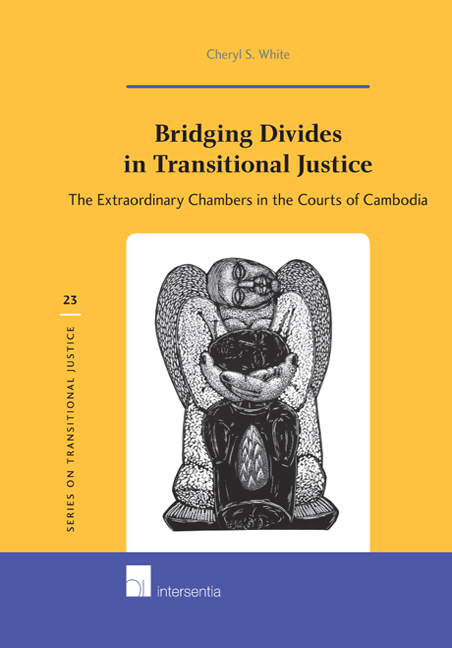Book contents
- Frontmatter
- Acknowledgements
- Contents
- Table of Cases
- Table of Legislation
- Table of Treaties
- List of Abbreviations
- Chapter 1 Introduction
- Chapter 2 Trials in Transitional Justice Theory
- Chapter 3 The Development of the Transitional Trial
- Chapter 4 The Creation of the Extraordinary Chambers in the Courts of Cambodia
- Chapter 5 Inquisitorial Criminal Procedure at the ECCC
- Chapter 6 Trial Dialogue in Case 001
- Chapter 7 The Voice of the Victim
- Chapter 8 The Voice of the Court in Judgment: Case 001
- Chapter 9 Conclusion
- Bibliography
- Index
- About the Author
Chapter 2 - Trials in Transitional Justice Theory
Published online by Cambridge University Press: 27 September 2018
- Frontmatter
- Acknowledgements
- Contents
- Table of Cases
- Table of Legislation
- Table of Treaties
- List of Abbreviations
- Chapter 1 Introduction
- Chapter 2 Trials in Transitional Justice Theory
- Chapter 3 The Development of the Transitional Trial
- Chapter 4 The Creation of the Extraordinary Chambers in the Courts of Cambodia
- Chapter 5 Inquisitorial Criminal Procedure at the ECCC
- Chapter 6 Trial Dialogue in Case 001
- Chapter 7 The Voice of the Victim
- Chapter 8 The Voice of the Court in Judgment: Case 001
- Chapter 9 Conclusion
- Bibliography
- Index
- About the Author
Summary
INTRODUCTION
While the meaning of the term ‘transitional justice’ is not immediately apparent, there is consensus that transitional justice is concerned broadly with how postconflict societies come to terms with their history of large-scale violence. The notion of post-conflict justice, sometimes used interchangeably with the term transitional justice, is more narrowly focused on the norm of accountability for past human rights abuses, combatting impunity and restoring failed or weakened national justice systems following internal conflicts. The two concepts converged in the notion of transitional justice articulated in the United Nations Secretary-General's 2004 report:
The notion of ‘transitional justice’ … comprises the full range of processes and mechanisms associated with a society's attempts to come to terms with a legacy of large scale past abuses, in order to ensure accountability, serve justice and achieve reconciliation.
Multiple aims of transitional justice are identified in this formulation, and the significance of communication is implicit in the identification of a society's engagement with its past as the focal point of transitional justice work. Transitional justice is not limited to a single mechanism. According to the Secretary-General, the range of justice mechanisms or processes that may be engaged includes:
Both judicial and non-judicial mechanisms, with differing levels of international involvement (or none at all) and individual prosecutions, reparations, truth seeking, institutional reform, vetting and dismissals, or a combination thereof.
However, the form and philosophy of the respective mechanisms affect the nature and depth of engagement with the past that is possible within each as they operate. In other words, dialogue on the past will be shaped by the form that transitional justice assumes. Generally, truth-seeking mechanisms provide victims and perpetrators of crimes with a locally-based forum for dialogue on the crimes committed. Based on principles of restorative justice, the proceedings are victim-centred and operate to reintegrate offenders through relatively flexible procedure. Criminal trials, on the other hand, follow rules of evidentiary procedure and fair trial conventions towards retributive outcomes. Dialogue in trials is limited to evidentiary matters, unless flexibility in trial procedure permits broader discussion within the bounds of criminal law principles.
- Type
- Chapter
- Information
- Bridging Divides in Transitional JusticeThe Extraordinary Chambers in the Courts of Cambodia, pp. 17 - 46Publisher: IntersentiaPrint publication year: 2017

